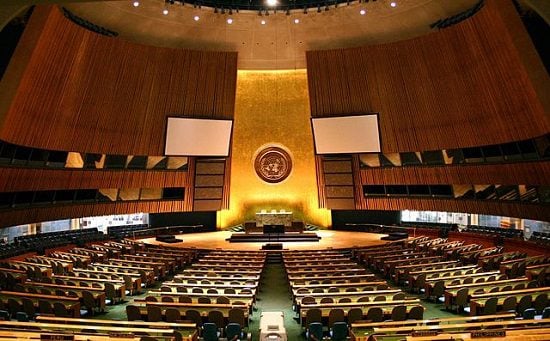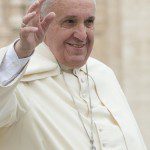United Nations General Assembly hall in New York City (photograph by Patrick Gruban, 12-17-06) [Wikimedia Commons / Creative Commons Attribution-Share Alike 2.0 Generic license]
* * * * *
I wrote an article yesterday defending the pope’s speech to Congress, and saying that he need not always explicitly mention abortion. I denounced true grumbling and complaining about the speech, but at the same time, opined that it is not necessarily wrong for someone — especially pro-life activists — to be (respectfully) disappointed that he was not more forceful in his remarks, citing at length the example of Blessed Mother Teresa’s very strong deunciations of abortion in her talks to the UN in 1985 and the National Prayer Breakfast in 1994. Literally a few minutes before I heard about Pope Francis’ speech to the UN on 9-25-15 (this very day, as I write), I virtually predicted the future, in my advocacy of a tolerant “both/and” approach (the pope made a “prophet” of me!). I had written the following words within 18 minutes prior to writing this paper, as an “Addendum” to my previous article (linked above):
The Catholic Church is big enough to incorporate multiple approaches. The Holy Father has made it clear (see, e.g., this excellent article by Phil Lawler) that he is taking a “pastoral” approach.
Another approach is the “prophetic” one, which is equally biblical and valid. An example of that would be Blessed Mother Teresa’s strong denunciations of abortion that she made at the UN in 1985 and the National Prayer Breakfast in 1994, as I noted above.
Jesus was “prophetic” when He turned over the tables of the moneychangers and confronted the Pharisees and Sadducees. He was pastoral almost all of the time when interacting with seekers and open-minded people.
St. Paul was prophetic when he denounced the sins of the Galatians and Corinthians. He was pastoral with the Athenians on Mars Hill.
Elijah was prophetic when he opposed the false prophets on Mt. Carmel.
David was alternately prophetic and pastoral in the Psalms.
St. Stephen was prophetic when he denounced the sins of the Jewish leaders, just before he was stoned to death.
So I say it’s great that Pope Francis takes one approach. That’s prudentially good for him at this particular time in history, and given his office.
It’s also good that others are prophetic, and it isn’t wrong for a pro-life activist to have wished that the pope was more “prophetic” in talking to Congress.
But since he wasn’t, it must be accepted in trust that he knows what he’s doing; and no one should publicly grumble and complain in a sinful, divisive way.
There are multiple strategies for different situations in the pro-life movement as well. The Planned Parenthood videos are extremely confrontational in intent. The result was a nationwide horror at what they contained, leading to much discussion and quite possibly massive defunding. That’s a very good result. In many other situations, a more pastoral approach is called for.
The problem is, so often, that people think their approach or method is the best and only way, and don’t allow for others to be different. This is occurring on both sides of the current raging debate about what the pope should or shouldn’t have said to Congress.
The Catholic Church is bigger than all that. It has and allows for plenty of diversity and sub-dogmatic difference of opinion or practice or approach.
Both/and rather than either/or.
I had noted in my paper yesterday that Pope Francis denounced abortion (being more “prophetic”) in many other instances. Lo and behold, immediately after writing that, I learned that the pope made considerably more “direct” remarks about abortion and other issues of particular concern to so-called “conservative” Catholics, at the UN. Thus, he chose to be relatively more prophetic in that speech, within an overall style that is predominantly pastoral. Once again, Pope Francis has, marvelously confounded critics on both the “left” and “right” of the theological and political spectrum. He has done what I’ve been saying about him in my defenses for over two years now. He doesn’t fit into the boxes that both right and left try to force him into. He is simply a profoundly orthodox, committed, compelling, heroic Catholic. Period. End of story. US News & World Report (9-25-15), citing the AP, described his UN talk as follows:
Pope Francis is demanding respect for the sacredness of all life, in a reference to abortion. His comments are sure to please conservatives who have complained that he doesn’t speak out enough against abortion.
Francis made the comments at the United Nations on Friday. The Vatican has long objected to U.N. calls for access to contraception and abortion for women.
In a speech to the General Assembly, Francis offered conservatives a lot to cheer: He called for a respect for all life and called for recognition of what he called the “natural difference between man and woman” — a reference to the Vatican’s opposition to gender theory.
He denounced what he called “ideological colonization” of the developing world — a reference to how ideas about contraception and gay rights are often imposed on poor nations as a condition for development aid.
Here are some of the “traditional morality / pro-life” remarks made by the Holy Father in this speech:
[E]very creature, particularly a living creature, has an intrinsic value, in its existence, its life, its beauty and its interdependence with other creatures.
These pillars of integral human development have a common foundation, which is the right to life and, more generally, what we could call the right to existence of human nature itself.
The misuse of creation begins when we no longer recognize any instance above ourselves, when we see nothing else but ourselves” (ID. Address to the Clergy of the Diocese of Bolzano-Bressanone, 6 August 2008, cited ibid.). Consequently, the defence of the environment and the fight against exclusion demand that we recognize a moral law written into human nature itself, one which includes the natural difference between man and woman (cf. Laudato Si’, 155), and absolute respect for life in all its stages and dimensions (cf. ibid., 123, 136).
The common home of all men and women must continue to rise on the foundations of a right understanding of universal fraternity and respect for the sacredness of every human life, of every man and every woman, the poor, the elderly, children, the infirm, the unborn, the unemployed, the abandoned, those considered disposable because they are only considered as part of a statistic. This common home of all men and women must also be built on the understanding of a certain sacredness of created nature.
Without the recognition of certain incontestable natural ethical limits and without the immediate implementation of those pillars of integral human development, the ideal of “saving succeeding generations from the scourge of war” (Charter of the United Nations, Preamble), and “promoting social progress and better standards of life in larger freedom” (ibid.), risks becoming an unattainable illusion, or, even worse, idle chatter which serves as a cover for all kinds of abuse and corruption, or for carrying out an ideological colonization by the imposition of anomalous models and lifestyles which are alien to people’s identity and, in the end, irresponsible.
When will the second-guessing and endless criticism of this pope ever end? Can’t the man be trusted to know what he is doing? Can we not extend to him the benefit of the doubt that we routinely offer others every day? Hopefully, this will be a lesson learned, for those who were so vigorously condemning him yesterday. But based on past history with this Pontiff, and the long, sad accounts of man’s rebelliousness against God and human authority that we observe particularly in the Old Testament’s accounts, I won’t hold my breath . . .














